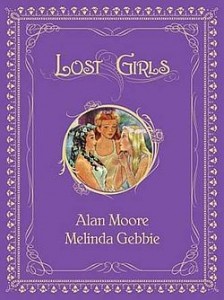 When New Zealand cartoonist Dylan Horrocks (Hicksville, Batgirl) requested that his local Auckland library purchase a copy of Alan Moore’s Lost Girls, the library denied his request with the argument that the book potentially violated New Zealand law.
When New Zealand cartoonist Dylan Horrocks (Hicksville, Batgirl) requested that his local Auckland library purchase a copy of Alan Moore’s Lost Girls, the library denied his request with the argument that the book potentially violated New Zealand law.
Horrocks received a response from the Library, which he posted on his Facebook page:
Just heard back from Auckland Libraries on my request for Lost Girls (Alan Moore & Melinda Gebbie):
“Thank you for your suggestion to purchase ‘Lost Girls’ by Alan Moore. Due to the depictions contained within this graphic novel we have been advised by the Office of Film and Literature Classification that we may be at risk of prosecution if we made the book available to customers. As a result Auckland Libraries will not be purchasing copies of this title.”
The Films, Videos, and Publications Classification Act of 1993 — commonly called New Zealand’s Censorship Law — prohibits select content from media. In Section 3 of the Classification act, it states that
…publication may be restricted or banned if it ‘describes, depicts, expresses, or otherwise deals with’ matters such as sex, horror, crime, cruelty, or violence. If a publication is restricted or banned, this means that it is likely to be harmful to society if made freely available. Publications that promote or support, or tend to promote or support certain activities, such as the sexual exploitation of children, must be banned.
Lost Girls is, in fact, filled with sex. Following adult incarnations of childhood fairy tale heroines Dorothy Gale of The Wizard of Oz, Alice from Alice’s Adventures in Wonderland, and Wendy of Peter Pan as they reminisce over erotic memories from their past, the book depicts sexual encounters ranging from consensual to abuse. Although Moore freely admits that Lost Girls is pornographic, the most interesting themes of the story comes from the postmodernist deconstruction of beloved children’s tales as a means of sexual discovery — and not all discoveries end happily ever after. The controversial title has been the subject of censorship in the past, and it was nearly criminalized in 2010 under Britain’s Coroners and Justice Act of 2009.
It seems practical to make materials available that reflect a variety of life experiences and interests, especially in a public library. In fact, up until 2008 both the Auckland City Libraries and North Shore Libraries held the book, which had been purchased in response to a customer suggestion only to be removed for fear of prosecution.
Horrocks received further explanation from Louise LaHatte, the Regional Resource Manager for the Aukland Library, which illustrates the difficult position libraries are in because of the law. LaHatte points out that even though the book was once available at the libraries, it was removed for fear of prosecution for supplying or possession of an objectionable publication:
Unlike DVDs and games which are all assessed by the [Office of Film and Literature Classification], books are only assessed if an individual submits the book to the Office, and Lost Girls had not been submitted at that time. In discussion about the content of the book, they thought it might fall into their definition of objectionable material, for example “particular weight shall be given to the extent and degree to which, and the manner in which, the publication describes, depicts, or otherwise deals with …(iv) Sexual conduct with or by children, or young persons, or both…” etc.
There are other factors in the legislation that they take into account including artistic merit and value, so the only way for them to advise if it is objectionable is if someone submits it, and they sent me information about how to do this. Auckland City Libraries did not think it was appropriate for us to submit a book for classification, with the possible outcome that it was banned. This could be interpreted as libraries trying to ban books, when our intention was to clarify our legal position.
LaHatte goes on to point out that the library Collection Development Policy is committed to freedom of access of information, and shared a recent encounter with a patron who was offended by available materials.
Just last week I emailed all library staff to confirm that Auckland Libraries will continue to provide copies of Ted Dawes Into the River despite a customer complaint about its sexual content, and referred staff to the Collection Development Policy on our website, which affirms our commitment to freedom of access to information.
LaHatte acknowledges the responsibility libraries bear in fighting censorship and the importance of intellectual freedom, and that the circumstances surrounding the move to keep Lost Girls off shelves are exceptional. In his comments on the letter, Horrocks defends the Aukland Library has a champion of graphic novels, but he raises concerns about the move to refuse to shelve Lost Girls:
In my opinion, the treatment of Lost Girls is, as Louise suggests, exceptional. I happen to believe it’s also misguided and misinformed and runs counter to the library’s stated values.
Please help support CBLDF’s important First Amendment work and reporting on stories such as this by making a donation or becoming a member of the CBLDF!
Casey Gilly is a comics journalist and cat enthusiast living in Oakland, CA where she eats tacos and plays ukulele.